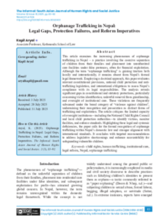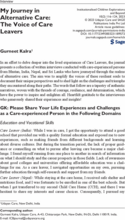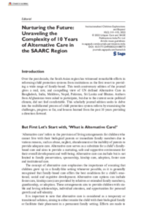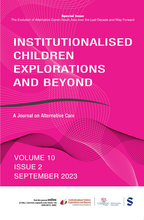This country page features an interactive, icon-based data dashboard providing a national-level overview of the status of children’s care and care reform efforts (a “Country Care Snapshot”), along with a list of resources and organizations in the country.
demographic_data
childrens_living_arrangement
children_living_without_bio
adoption
social_work_force
key_stakeholders
Key Stakeholders
Add New DataOther Relevant Reforms
Add New Datadrivers_of_institutionalisation
Drivers of Institutionaliziation
Add New Datakey_research_and_information
Key Data Sources
Add New DataAct Relating to Children 2018 - Nepal
Trafficking in Persons Report June 2018
Country Care Review: Nepal
Acknowledgements
Data for this country care snapshot was contributed by Forget Me Not and UNICEF Nepal.
Displaying 1 - 10 of 140
This article examines how children in Nepal are migrating either within the country or across borders—sometimes alone and other times with families—driven by a range of factors including lack of parental care, poverty, limited access to education
This paper explores the lived experiences of Bhutanese unaccompanied and separated refugee children living in camps in eastern Nepal, examining how they navigate prolonged displacement, statelessness, and institutional neglect through ethnographic and narrative methods. It argues that these children exist in a “state-of-nowhere,” rendered politically and administratively invisible within refugee governance systems, and calls for rights-based, child-centred responses that address the structural and epistemic violence shaping their exclusion.
This article examines the increasing phenomenon of orphanage trafficking in Nepal – a practice involving the coercive separation of children from their families and placement into unauthorized care facilities under false pretences, often for financial exploitation. It evaluates relevant constitutional provisions, national child protection and anti-trafficking legislation, and international obligations to assess Nepal’s compliance with its legal responsibilities.
Adoptees return to find a society that no longer recognises them, legally or socially
Foreign money fuels fake orphanages in Nepal where children are taken from their parents and marketed as victims. But the fightback is on
Case studies from the Global South provide insights on how to effectively support children who have experienced violence.
The 5th Biennial International Conference on Alternative Care for Children in Asia (BICON) will take place over two days, on 6-7th September 2023, in Kathmandu, Nepal.
This is a series of written interviews conducted with care-experienced persons from Bhutan, India, Nepal and Sri Lanka who have had experience with alternative care. These interviews were published in the September 2023 issue of the Institutionalised Children Explorations and Beyond journal.
In this editorial, Ian Forber-Pratt, editor of this tenth anniversary edition of the Institutionalised Children Explorations and Beyond, gives an of alternative care in Bangladesh, India, Maldives, Nepal, Pakistan, Sri Lanka and Bhutan.
This article focuses on the national efforts advancing children’s right to alternative care services in Nepal. It presents the government’s existing laws and policies in providing responsible care to children in need of special protection and for children who cannot be placed in parental care due to various reasons for family separation.




